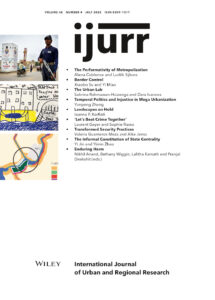We argue that state agencies in Mumbai involved in urban environmental governance, specifically river governance, have made real estate and property urbanism more durable amidst the crisis of rising waters through the performance of ambivalent governance. This ‘ambivalencing’ entails government agencies enacting differential practices selectively across and within two interfaces which characterize the governance of flood threat: environmental protection and real estate development (protection vs. development) on the one hand; and informality (elite informalities vs. survival informalities) on the other. We show how ambivalencing as a modality of political power distributes socio-material and discursive harm by being strong in real estate development and slum displacement and weak in protecting the environment and the city’s poor. Ambivalent governance regimes draw on new political logics, where we see the language of protection serve the motive of growth on the one hand, while replaying older inequities by serving as an instrument of dispossession on the other. State-led informalities—facilitated through formal plans and laws alongside informal agreements to suspend laws or tolerate violations—are central to this governance regime. We conclude with a reflection on the need to grasp the modalities of ambivalent governance and assemble a counter-politics to reclaim environmental protection by anchoring it to notions of justice for the vulnerable, both human and non-human.
Details
Written by:
Lalitha Kamath & Anushri Tiwari
Digital Object Identifier (DOI)
10.1111/1468-2427.13092
About DOI

